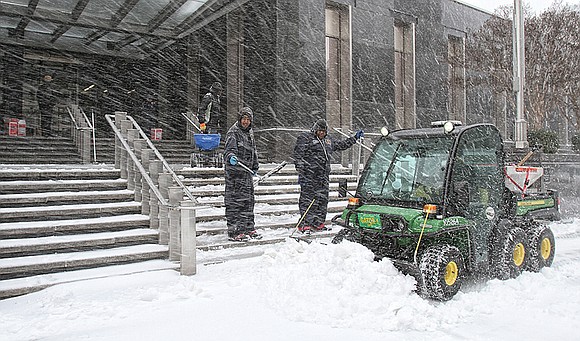Private contractors costing city big $ for snow removal
Jeremy M. Lazarus | 2/9/2018, 7:07 a.m.

When snow falls in Richmond, City Hall is forced to pay big bucks to private contractors to clear the streets.
The reason: Up to half of the aging fleet of city dump trucks that double as snowplows are usually parked, awaiting repairs, according to a new report from the Department of Public Works.
The result: Taxpayers are saddled with a far bigger bill because of the city’s failure to replace old trucks on a timely schedule, the report noted.
In the three snowfalls this winter — Dec. 8, Jan. 3 and Jan. 16 — the city spent about $2 million, including salting and sanding. That’s about $1 million more than was set aside for snow operations.
City Hall will have to shift money in the current budget, with City Council approval, to cover the $1 million extra cost. That amount could grow if there is another snowfall in the coming weeks.
Excluding the cost of salt and sand, the main reason snow removal cost so much is the expense for outside contractors, who received nearly $1.2 million, or about 59 percent of the $2 million total, to provide 10 pieces of snow equipment.
The total payment to outside contractors was triple the $391,000 that the city spent to pay its own workers and operate its own trucks to clear 41 main snow routes and 19 secondary routes, according to the Jan. 25 report to City Council’s Governmental Operations Committee.
The Jan. 3 snowfall exemplifies the extra cost.
The report shows that the city paid its own employees $148,000 in regular and overtime pay for the four days they spent plowing snow or salting and sanding streets, and another $68,000 in fuel and other costs to deploy about 25 working city trucks. Total: $216,000.
The additional cost to deploy private contractors for the Jan. 3 snow removal: $674,415, the report states.
City Hall also spent nearly $41,410 on private contractors for the Dec. 8 snow and another $468,000 for the Jan. 16 snow. The payment for a private contractor’s truck is $500 per hour, the report stated.
The city actually has enough trucks to do the job, according to the report. It owns 40 dump trucks that can be equipped with snowplows, or about one for each of the main snow routes like Broad Street that are first to be cleared.
The problem is the average age of the workhorse trucks is 9 years, and “15 to 19 (of the trucks) are consistently in the shop,” the report stated.
The Department of Public Works has been granted funding to buy three replacement trucks that should arrive this month, Keith Rogers Jr., a senior policy adviser to Public Works Director Bobby Vincent Jr., told the committee led by City Councilman Andreas Addison, 1st District.
Mr. Rogers said the department needs 17 more replacement trucks at a cost of $2.2 million to complete its fleet and be capable of doing the job without private contractors.
The situation with the dump trucks that handle snow duties is typical of a city fleet that routinely is shortchanged.
A 2015 audit of the city’s fleet operations noted that a city consultant found 43 percent of the city’s 2,600 trucks, cars and other vehicles are obsolete and need replacement.
That audit was issued a year after Public Works officials outlined to City Council a plan to begin replacement on a steady schedule.
Mr. Addison, who was employed at City Hall at the time, helped develop the replacement plan that was designed to ensure the city’s fleet turned over regularly. But as he noted at last week’s committee hearing, the $7 million a year program never was fully funded.
Since 2008, the city has spent an average of $3.5 million annually on vehicle replacement, far short of the $7 million a year the Public Works report indicated was a minimum requirement.
Mayor Levar M. Stoney, who has promised greater efficiency in city government, has not shown an interest in increasing funding to replace outdated city vehicles. Since taking office, he has put money left over from a previous fiscal year into savings.
Soon after taking office a year ago, Mayor Stoney learned the city finished the 2015-16 fiscal year with a $13 million surplus. He decided to put it all into savings in a quest to gain a triple A bond rating for the city. None was spent on critical needs such as vehicle replacement, according to city records and City Council information.
This year, when City Hall achieved a $16 million surplus in the 2016-17 fiscal year, Mayor Stoney put the majority into savings again. City Council, however, directed that $7.4 million of the surplus be spent, including $2.4 million for bonuses for city employees, $2 million for street and sidewalk improvements and $2 million to aid the city’s underfunded pension plan. City Council also set aside $1 million for school maintenance.
None went to the purchase of new city vehicles.
The mayor will introduce the city’s proposed 2018-19 budget in March.






